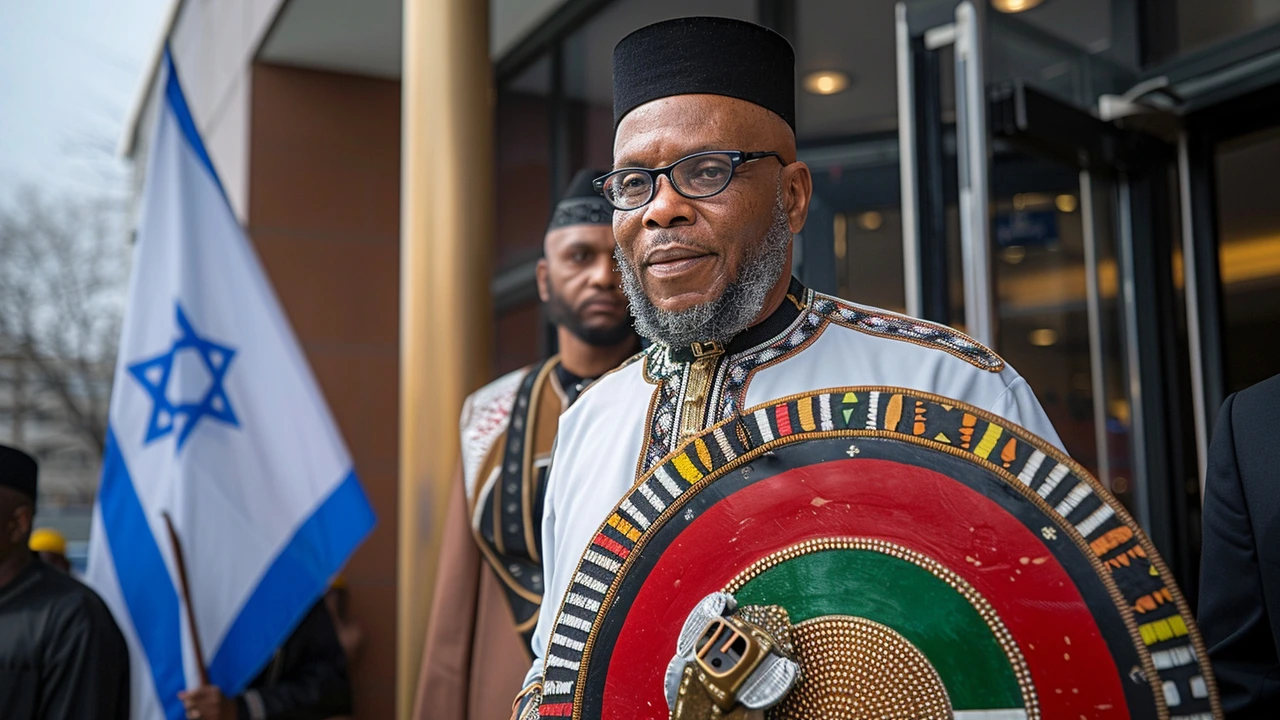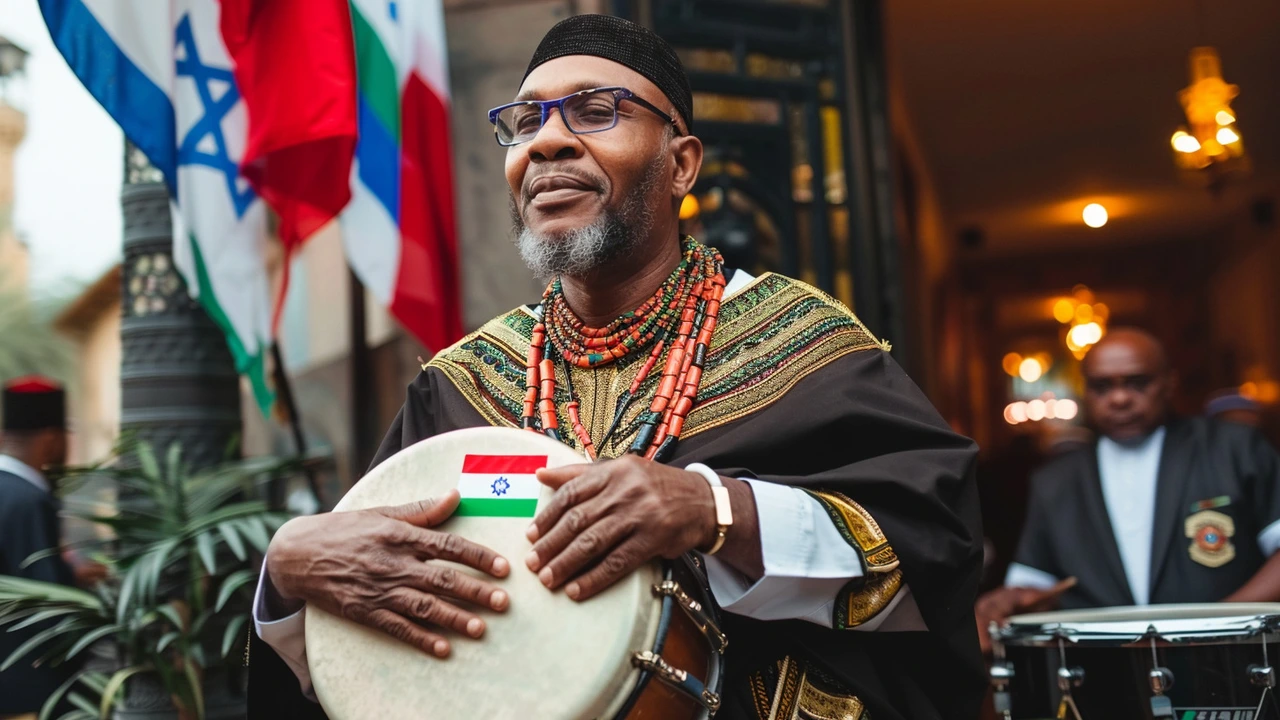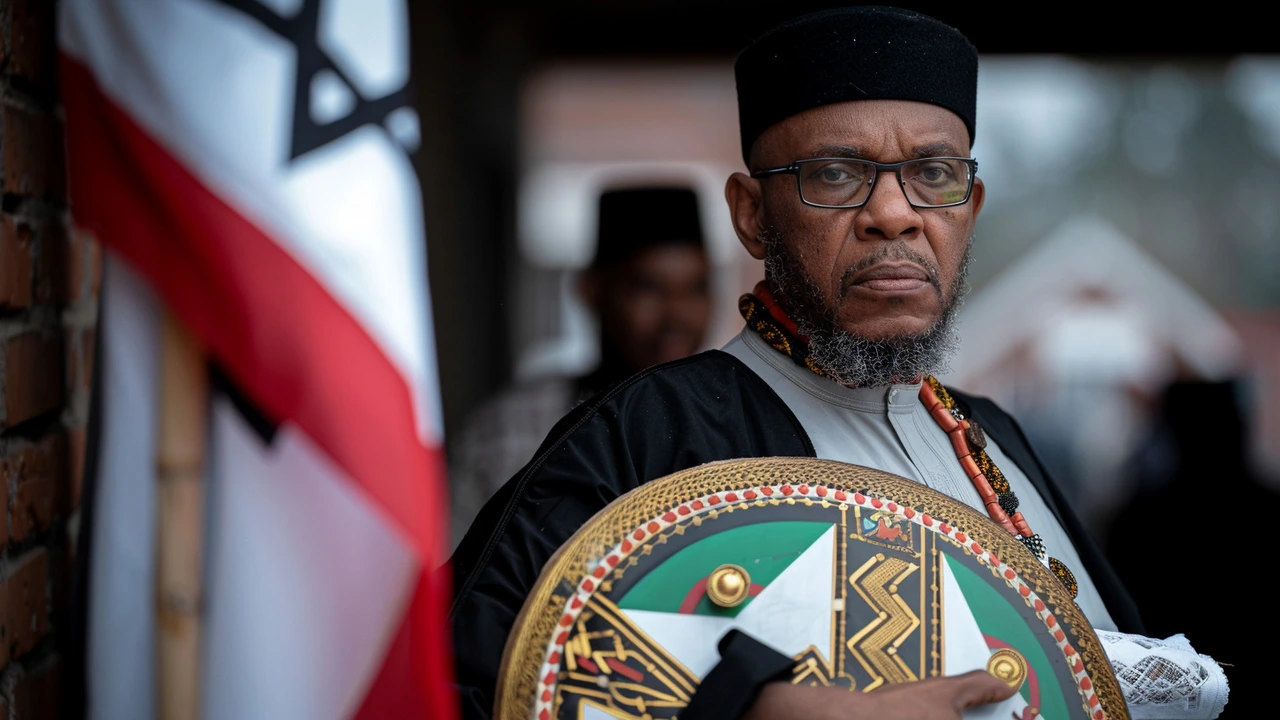
Nnamdi Kanu Seeks Out-of-Court Settlement in Treason Case
Nnamdi Kanu, the prominent leader of the Indigenous People of Biafra (IPOB), is making headlines once more as he seeks an out-of-court settlement with the Nigerian government. This recent move is aimed at dismissing the treasonable felony charges laid against him, stemming from his activism and leadership in the secessionist movement. Kanu's campaign focuses on the creation of the independent Biafra Republic, detaching itself from Nigeria.
The Road to Legal Entanglement
Nnamdi Kanu's legal journey has been both protracted and contentious. Originally arrested in 2015, Kanu was granted bail in 2017. However, he breached his bail conditions and subsequently fled Nigeria, only to be rearrested in 2021. Despite various legal maneuvers, his case has proceeded with unwavering momentum. In 2022, the Court of Appeal dismissed some charges against him, only for the Supreme court to order that his trial continue in Abuja in December 2023. The legal pendulum has thus swung back and forth, leaving Kanu embroiled in a complex web of accusations and legal battles.
Legal Maneuvers and Court Proceedings
At a recent hearing, Kanu's lawyer, Alloy Ejimakor, presented Kanu's desire to negotiate an out-of-court settlement to Judge Binta Nyako. Ejimakor's statement indicated Kanu's readiness to engage in discussions that could potentially lead to the dismissal of the charges. The government's prosecuting lawyer, Mr. Awomolo, responded by asserting that he lacked the authority to negotiate, and directed Kanu to approach the Attorney-General of the Federation (AGF) who holds the requisite statutory powers to negotiate on the government's behalf. Essentially, any dialogue between Kanu and the government must be routed through the AGF, as it is this office that can entertain and finalize such high-level negotiations.
Judge Binta Nyako, presiding over the case at the Federal High Court in Abuja, expressed no objections to the idea of an out-of-court settlement. However, the judge underscored the procedural necessity of Kanu approaching the AGF for such negotiations. Moreover, Judge Nyako reaffirmed the court's jurisdiction over the charges, dismissing Kanu’s fresh application challenging the validity of some counts. The judge further ordered the prosecution to file and serve its proof of evidence on Kanu and adjourned the proceedings until September 24 for further hearings.
Matters of Contempt and Court Orders
Adding another layer of complexity, Kanu has accused the State Security Service (SSS) of contempt. The accusation rests on the claims that the SSS has disobeyed court orders by failing to provide a safe and un-bugged room for Kanu to meet with his legal team. In response, the judge ordered the SSS to ensure that a safe space is provided for such legal consultations. The SSS’s adherence or non-compliance with this order may not only affect future court proceedings but could also impact the ongoing negotiations for an out-of-court settlement.

The Implications of an Out-of-Court Settlement
The potential out-of-court settlement carries numerous implications for both Kanu and the broader political landscape of Nigeria. If successful, it could signify a de-escalation of tensions between the Nigerian state and the IPOB movement. However, it may also raise questions about the government's stance on separatist activities and the rule of law. For Kanu, it offers a possible avenue to evade the severe repercussions of a conviction for treason, which could include long-term imprisonment or other punitive measures.
The push for Biafra has roots deep in Nigerian history, tracing back to the Nigerian Civil War (1967-1970), commonly referred to as the Biafran War. The conflict was a result of ethnic, political, and economic tensions that saw the southeastern region of Nigeria attempt to secede and form the Republic of Biafra. Although the war ended with Biafra's reintegration into Nigeria, the sentiments for secession have persisted, embodied by Kanu and the IPOB.
The Role of the Attorney-General
The Attorney-General of the Federation plays a crucial role in this case. As the principal legal officer of the country, the AGF possesses the authority to drop charges, enter into negotiations, and make legally binding decisions on behalf of the government. Kanu’s approach to the AGF for an out-of-court settlement places significant responsibility on the AGF to weigh the benefits and possible ramifications of such a resolution. This decision would have to be made in the context of national security, public interest, and the legal precedents that it may establish.
The outcome of these negotiations, should they proceed, will likely have far-reaching impacts. It will test the Nigerian government’s flexibility in dealing with secessionist movements while adhering to the principles of justice and law. Additionally, it will gauge the reception of such a settlement among the Nigerian populace and international community, both of which have vested interests in the stability and unity of Nigeria.
International Perspectives
Nnamdi Kanu’s case has garnered international attention, partially due to his status as a dual citizen of Nigeria and the United Kingdom. This adds a layer of diplomatic nuance to the proceedings. The British government has previously expressed concern over Kanu’s treatment and trial, urging the Nigerian government to ensure that his rights are protected. The involvement of foreign governments and international human rights organizations could influence the dynamics of the case and negotiation process.
Secessionist movements and cases involving political dissidents are not unique to Nigeria. Across the globe, countries grapple with similar challenges, balancing national unity with demands for autonomy or independence from various ethnic or political groups. The resolution of Kanu’s case may serve as a case study for other nations facing similar dilemmas.

The Road Ahead
As Kanu's legal team prepares for the next hearing in September, the spotlight remains on their strategic maneuvers both in and out of the courtroom. The proposed settlement talks introduce a new dynamic to the proceedings, offering a potential path out of the legal quagmire that has enveloped Kanu for years. These developments also signal a period of heightened political negotiation and legal maneuvering that could redefine the future of the IPOB movement and its quest for Biafra.
The next few months will be pivotal, not only for Kanu but for the Nigerian legal and political landscape. Stakeholders within and outside Nigeria will be watching closely as the case unfolds, interested in both the legal outcomes and the broader socio-political implications. For Kanu, the pursuit of an out-of-court settlement represents a strategic pivot, aiming to secure his freedom and continue his activism under different circumstances.
Ultimately, the interplay of legal arguments, political considerations, and potential negotiations places this case at a critical juncture. Kanu's trial is not just a legal proceeding but a touchstone for the issues of justice, governance, and national identity in Nigeria. Whether through the courtroom or the negotiation table, the resolution of this case will undoubtedly leave a lasting imprint on the nation’s history.
Comments (8)
-
Umesh Nair June 20, 2024
Kanu thinkin he can just slide his way out of a treason case? Definately not when the whole nation is watchin. The court ain’t a playground for political drama, it's a serious arena. So this settlement talk feels like a desperate move, not a clever strategy.
-
kishore varma June 20, 2024
Wow, the drama is real! 🌍🌟 This feels like a high‑stakes chess game, with every move sparking fireworks. Can’t wait to see how the next chapter unfolds! 🔥😉
-
Kashish Narula June 20, 2024
It’s crucial we keep dialogue open and seek peaceful outcomes; after all, lasting peace comes from understanding, not from endless litigation… I feel hopeful that a settlement could ease tensions, yet we must stay vigilant. The people deserve clarity, stability, and justice; let’s all stay respectful and keep the conversation constructive.
-
smaily PAtel June 20, 2024
While the sentiment is noble, the legal framework is explicit; the Constitution, the Criminal Code, and precedents-all delineate the limits of political protest, especially when it borders on treason, therefore any settlement must align with statutory authority, otherwise it sets a dangerous precedent, consequently the Attorney‑General’s role is pivotal, and the judiciary cannot be bypassed, indeed the rule of law must prevail.
-
Hemanth NM June 20, 2024
Kanu’s legal dance is a circus we can’t ignore.
-
rin amr June 20, 2024
The proposition of an out‑of‑court settlement smacks of political theater, yet it also hints at a pragmatic pivot. One must ask whether this is a genuine effort to de‑escalate or merely a tactical retreat. Either way, the stakes are too high for half‑measures.
-
Erica Watson-Currie June 20, 2024
When law meets ambition, the balance shifts. True resolution lies beyond courtrooms.
-
Mark Pelletier June 20, 2024
Considering the historical weight of the Biafran conflict, the contemporary legal maneuverings surrounding Kanu’s case cannot be isolated from the lingering narratives of identity, sovereignty, and collective memory; the dialogue between the state and secessionist actors reflects a broader contest over national cohesion, which, in turn, influences international perceptions of Nigeria’s democratic health, and these perceptions invariably impact diplomatic relations, economic partnerships, and humanitarian considerations; moreover, the involvement of the Attorney‑General as a potential mediator introduces a layer of constitutional authority that must reconcile the imperatives of justice with the pragmatic demands of political stability, a reconciliation that is rarely straightforward; the judiciary’s role, while ostensibly neutral, is inevitably colored by the political climate, leading to judgments that may either reinforce the rule of law or be perceived as instruments of political expediency; as the settlement talks progress, one must remain attentive to the subtle signals sent to other separatist movements across the continent, for precedent can be a powerful catalyst, either deterring or emboldening future challenges to state authority; the media narrative, both domestic and international, plays a decisive part in shaping public opinion, wherein framing the settlement as a triumph of negotiation could either legitimize the government's approach or be dismissed as a concession that undermines legal accountability; ultimately, the outcome of this process will reverberate through Nigeria’s political fabric, influencing electoral dynamics, inter‑ethnic relations, and the ongoing quest for a cohesive national identity that respects diversity while maintaining unity.
